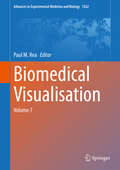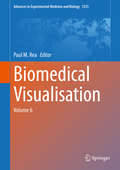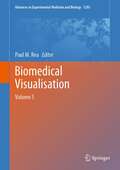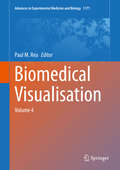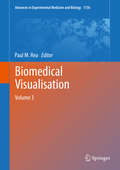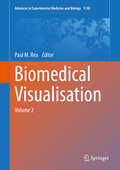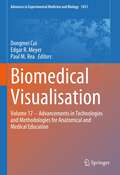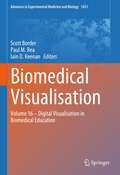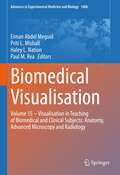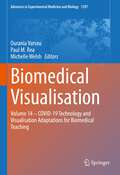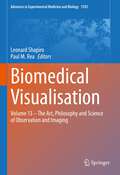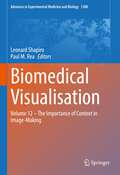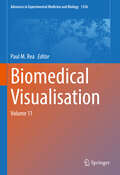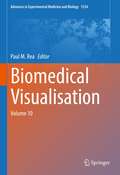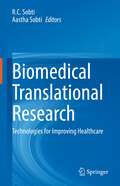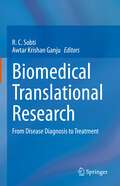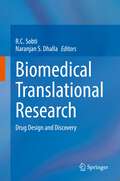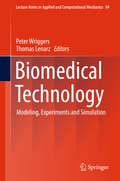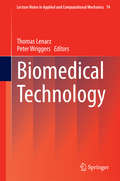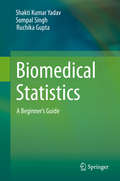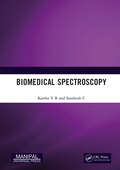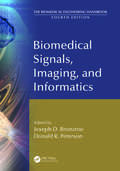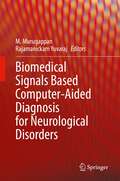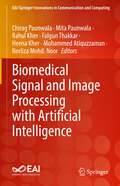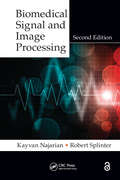- Table View
- List View
Biomedical Visualisation: Volume 7 (Advances in Experimental Medicine and Biology #1262)
by Paul M. ReaThis edited book explores the use of technology to enable us to visualise the life sciences in a more meaningful and engaging way. It will enable those interested in visualisation techniques to gain a better understanding of the applications that can be used in visualisation, imaging and analysis, education, engagement and training. The reader will be able to explore the utilisation of technologies from a number of fields to enable an engaging and meaningful visual representation of the biomedical sciences, with a focus in this volume related to anatomy, and clinically applied scenarios. All chapters in this volume feature collaborative and innovative postgraduate research projects from graduate students of the MSc Medical Visualisation and Human Anatomy. This pioneering, world-leading postgraduate taught degree program is a joint partnership degree between the School of Life Sciences within the College of Medical, Veterinary and Life Sciences in the University of Glasgow, and the School of Simulation and Visualisation, The Glasgow School of Art. These chapters truly showcase the amazing and diverse technological applications that have been carried out as part of their research projects.
Biomedical Visualisation: Volume 6 (Advances in Experimental Medicine and Biology #1235)
by Paul M. ReaThis edited book explores the use of technology to enable us to visualise the life sciences in a more meaningful and engaging way. It will enable those interested in visualisation techniques to gain a better understanding of the applications that can be used in visualisation, imaging and analysis, education, engagement and training. The reader will be able to explore the utilisation of technologies from a number of fields to enable an engaging and meaningful visual representation of the biomedical sciences, with a focus in this volume related to anatomy, and clinically applied scenarios. The first eight chapters examine a variety of tools, techniques, methodologies and technologies which can be utilised to visualise and understand biological and medical data. This includes web-based 3D visualisation, ultrasound, virtual and augmented reality as well as functional connectivity magnetic resonance imaging, storyboarding and a variety of stereoscopic and 2D-3D transitions in learning. The final two chapters examine the pedagogy behind digital techniques and tools from social media to online distance learning techniques.
Biomedical Visualisation: Volume 5 (Advances in Experimental Medicine and Biology #1205)
by Paul M. ReaThis edited volume explores the use of technology to enable us to visualise the life sciences in a more meaningful and engaging way. It will enable those interested in visualisation techniques to gain a better understanding of the applications that can be used in visualisation, imaging and analysis, education, engagement and training. The reader will be able to explore the utilisation of technologies from a number of fields to enable an engaging and meaningful visual representation of the biomedical sciences, with a focus in this volume related to anatomy, and clinically applied scenarios. The first four chapters highlight the diverse uses of CT and MRI scanning. These chapters demonstrate the uses of modern scanning techniques currently in use both clinically and in research and include vascular modelling, uses of the stereoscopic model, MRI in neurovascular and neurodegenerative diseases, and how they can also be used in a forensic setting in identification. The remaining six chapters truly demonstrate the diversity technology has in education, training and patient engagement. Multimodal technologies are discussed and include art and history collections, photogrammetry and games engines, augmented reality and review of the current literature for patient rehabilitation and education of the health professions. These chapters really do provide “something for everyone” whether you are a student, faculty member, or part of our curious global population interested in technology and healthcare.
Biomedical Visualisation: Volume 4 (Advances in Experimental Medicine and Biology #1171)
by Paul M. ReaWith the rapid advances of technology, visualisation in the sciences using computers, is a rapidly expanding and evolving area. Visualisation in its broadest sense represents how objects, situations, applications, methodologies and information can be seen and presented. This proposal is to incorporate work in the field of biomedical visualisation and will encompass techniques of using computers to visualise information. This will include photogrammetry, virtual and augmented reality, 3D printing, e-tutorial and website design and digital reconstructions and animations. It will showcase research, innovations and current work in the field of biomedicine, life sciences, veterinary medicine and computing sciences presenting data in an innovative and engaging way to showcase complex data and information in an easier to access format.
Biomedical Visualisation: Volume 3 (Advances in Experimental Medicine and Biology #1156)
by Paul M. ReaThis edited book explores the use of technology to enable us to visualise the life sciences in a more meaningful and engaging way. It will enable those interested in visualisation techniques to gain a better understanding of the applications that can be used in visualisation, imaging and analysis, education, engagement and training.The reader will be able to explore the utilisation of technologies from a number of fields to enable an engaging and meaningful visual representation of the biomedical sciences, with a focus in this volume related to anatomy, and clinically applied scenarios.The first six chapters have an anatomical focus examining digital technologies and applications to enhance education. The first examines the history and development of ultrasound, applications in an educational setting, and as a point-of-care ultrasound at the bedside. The second chapter presents a transferable workflow methodology in creating an interactive educational and training package to enhance understanding of the circadian rhythm. The third chapter reviews tools and technologies, which can be used to enhance off-campus learning, and the current range of visualisation technologies like virtual, augmented and mixed reality systems. Chapter four discusses how scanning methodologies like CT imagery, can make stereoscopic models. The fifth chapter describes a novel way to reconstruct 3D anatomy from imaging datasets and how to build statistical 3D shape models, described in a clinical context and applied to diagnostic disease scoring. The sixth chapter looks at interactive visualisations of atlases in the creation of a virtual resource, for providing next generation interfaces.The seventh and eight chapters discuss neurofeedback for mental health education and interactive visual data analysis (applied to irritable bowel disease) respectively.The final two chapters examine current immersive technologies –virtual and augmented reality, with the last chapter detailing virtual reality in patients with dementia.This book is accessible to a wide range of users from faculty and students, developers and computing experts, the wider public audience. It is hoped this will aid understanding of the variety of technologies which can be used to enhance understanding of clinical conditions using modern day methodologies.
Biomedical Visualisation: Volume 2 (Advances in Experimental Medicine and Biology #1138)
by Paul M. ReaThis edited book explores the use of technology to enable us to visualise the life sciences in a more meaningful and engaging way. It will enable those interested in visualisation techniques to gain a better understanding of the applications that can be used in visualisation, imaging and analysis, education, engagement and training. The reader will be able to explore the utilisation of technologies from a number of fields to enable an engaging and meaningful visual representation of the biomedical sciences. This use of technology-enhanced learning will be of benefit for the learner, trainer and faculty, in patient care and the wider field of education and engagement. This second volume on Biomedical Visualisation will explore the use of a variety of visualisation techniques to enhance our understanding of how to visualise the body, its processes and apply it to a real world context. It is divided into three broad categories – Education; Craniofacial Anatomy and Applications and finally Visual Perception and Data Visualization. In the first four chapters, it provides a detailed account of the history of the development of 3D resources for visualisation. Following on from this will be three major case studies which examine a variety of educational perspectives in the creation of resources. One centres around neuropsychiatric education, one is based on gaming technology and its application in a university biology curriculum, and the last of these chapters examines how ultrasound can be used in the modern day anatomical curriculum. The next three chapters focus on a complex area of anatomy, and helps to create an engaging resource of materials focussed on craniofacial anatomy and applications. The first of these chapters examines how skulls can be digitised in the creation of an educational and training package, with excellent hints and tips. The second of these chapters has a real-world application related to forensic anatomy which examines skulls and soft tissue landmarks in the creation of a database for Cretan skulls, comparing it to international populations. The last three chapters present technical perspetives on visual perception and visualisation. By detailing visual perception, visual analytics and examination of multi-modal, multi-parametric data, these chapters help to understand the true scientific meaning of visualisation. The work presented here can be accessed by a wide range of users from faculty and students involved in the design and development of these processes, to those developing tools and techniques to enable visualisation in the sciences.
Biomedical Visualisation: Volume 17 ‒ Advancements in Technologies and Methodologies for Anatomical and Medical Education (Advances in Experimental Medicine and Biology #1431)
by Paul M. Rea Dongmei Cui Edgar R. MeyerCurricula in the health sciences have undergone significant change and reform in recent years. The time allocated to anatomical education in medical, osteopathic medical, and other health professional programs has largely decreased. As a result, educators are seeking effective teaching tools and useful technology in their classroom learning.This edited book explores advances in anatomical sciences education, such as teaching methods, integration of systems-based components, course design and implementation, assessments, effective learning strategies in and outside the learning environment, and novel approaches to active learning in and outside the laboratory and classroom. Many of these advances involve computer-based technologies. These technologies include virtual reality, augmented reality, mixed reality, digital dissection tables, digital anatomy apps, three-dimensional (3D) printed models, imaging and 3D reconstruction, virtual microscopy, online teaching platforms, table computers and video recording devices, software programs, and other innovations. Any of these devices and modalities can be used to develop large-class practical guides, small-group tutorials, peer teaching and assessment sessions, and various products and pathways for guided and self-directed learning. The reader will be able to explore useful information pertaining to a variety of topics incorporating these advances in anatomical sciences education. The book will begin with the exploration of a novel approach to teaching dissection-based anatomy in the context of organ systems and functional compartments, and it will continue with topics ranging from teaching methods and instructional strategies to developing content and guides for selecting effective visualization technologies, especially in lieu of the recent and residual effects of the COVID-19 pandemic. Overall, the book covers several anatomical disciplines, including microscopic anatomy/histology, developmental anatomy/embryology, gross anatomy, neuroanatomy, radiological imaging, and integrations of clinical correlations.
Biomedical Visualisation: Volume 16 ‒ Digital Visualisation in Biomedical Education (Advances in Experimental Medicine and Biology #1421)
by Paul M. Rea Scott Border Iain D. KeenanWhen studying medicine, healthcare, and medical sciences disciplines, learners are frequently required to visualise and understand complex three-dimensional concepts. Consequently, it is important that appropriate modalities are used to support their learning. Recently, educators have turned to new and existing digital visualisation approaches when adapting to pandemic-era challenges and when delivering blended post-pandemic teaching.This book focuses on a range of key themes in anatomical and clinically oriented education that can be enhanced through visual understanding of the spatial three-dimensional arrangement and structure of human patients.The opening chapters describe important digital adaptations for the dissemination of biomedical education to the public and to learners. These topics are followed by reviews and reports of specific modern visualisation technologies for supporting anatomical, biomedical sciences, and clinical education. Examples include 3D printing, 3D digital models, virtual histology, extended reality, and digital simulation. This book will be of interest to academics, educators, and communities aiming to modernise and innovate their teaching. Additionally, this book will appeal to clinical teachers and allied healthcare professionals who are responsible for the training and development of colleagues, and those wishing to communicate effectively to a range of audiences using multimodal digital approaches.
Biomedical Visualisation: Volume 15 ‒ Visualisation in Teaching of Biomedical and Clinical Subjects: Anatomy, Advanced Microscopy and Radiology (Advances in Experimental Medicine and Biology #1406)
by Paul M. Rea Eiman Abdel Meguid Priti L. Mishall Haley L. NationThis book highlights the integration of science and imaging and demonstrates how we can teach and learn in a much more accessible, innovative, and engaging way using technology. This volume is particularly focused on three main themes: advanced microscopy, anatomy education, and radiology visualisation related to patient care. The chapters pertaining to advanced microscopy convey complex biomedical information by visual means. These chapters provide both an overview on the principles of microscopy and specific applications of microscopy that have led to groundbreaking discoveries. Chapters pertaining to education summarise the recent trends in teaching gross and microscopic anatomy and emphasise the creation and use of novel tools to support student learning. Lastly, the radiological visualisation segment dives into the history of radiographic imaging and highlights the profound effect technology has had on improving patient outcomes. This volume will be of particular interest to many; the scope of this book encompasses medicine, dentistry, allied health professions, biomedical sciences, anatomy and histology education, radiology, and microscopy. Students, researchers, educators, and clinicians will learn something new, be stimulated to ask innovative questions, and be inspired to continue the technological advancements pushing science forward.
Biomedical Visualisation: Volume 14 ‒ COVID-19 Technology and Visualisation Adaptations for Biomedical Teaching (Advances in Experimental Medicine and Biology #1397)
by Paul M. Rea Ourania Varsou Michelle WelshThis book focuses on the challenges to biomedical education posed by the lockdowns and restrictions to on campus teaching brought about by the COVID-19 pandemic and highlights the tools and digital visualization technologies that have been successfully developed and used for remote teaching. Biomedical education for science, medical, dental and allied health professionals relies on teaching visual and tactile knowledge using practice-based approaches. This has been delivered for decades via on-campus lectures, workshops and laboratories, teaching practical skills as well as fundamental knowledge and understanding. However, the arrival of the COVID-19 pandemic meant that education across the globe had to pivot very quickly to be able to deliver these skills and knowledge in a predominantly online environment. This brought with it many challenges, as Higher Education staff, had to adapt to deliver these visual subjects remotely. This book addresses the challenges and solutions faced by Higher Education staff in teaching visual content in distance education. Chapters include literature reviews, original research, and pedagogical reflections for a wide range of biomedical subjects, degrees such as medicine, dentistry and veterinary sciences with examples from undergraduate and postgraduate settings. The goal of the book is to provide a compendium of expertise based on evidence gathered during the COVID-19 pandemic, as well as reflections on the challenges and lessons learned from this dramatic shift in teaching. It also presents new examples of best practices that have emerged from this experience to ensure that they are not lost as we return to on-campus learning in a new era of biomedical teaching. This book will be of interest to anyone looking for a helpful reference point when designing online or blended teaching for visual practice-based subjects.
Biomedical Visualisation: Volume 13 – The Art, Philosophy and Science of Observation and Imaging (Advances in Experimental Medicine and Biology #1392)
by Leonard Shapiro Paul M. ReaThis book brings together current advances in high-technology visualisation and the age-old but science-adapted practice of drawing for improved observation in medical education and surgical planning and practice. We begin this book with a chapter reviewing the history of confusion around visualisation, observation and theory, outlining the implications for medical imaging. The authors consider the shifting influence of various schools of philosophy, and the changing agency of technology over time. We then follow with chapters on the practical application of visualisation and observation, including emerging imaging techniques in anatomy for teaching, research and clinical practice - innovation in the mapping of orthopaedic fractures for optimal orthopaedic surgical guidance - placental morphology and morphometry as a prerequisite for future pathological investigations - visualising the dural venous sinuses using volume tracing. Two chapters explore the use and benefit of drawing in medical education and surgical planning. It is worth noting that experienced surgeons and artists employ a common set of techniques as part of their work which involves both close observation and the development of fine motor skills and sensitive tool use.An in-depth look at police identikit construction from memory by eyewitnesses to crimes, outlines how an individual’s memory of a suspect’s facial features are rendered visible as a composite image.This book offers anatomy educators and clinicians an overview of the history and philosophy of medical observation and imaging, as well as an overview of contemporary imaging technologies for anatomy education and clinical practice. In addition, we offer anatomy educators and clinicians a detailed overview of drawing practices for the improvement of anatomical observation and surgical planning. Forensic psychologists and law enforcement personnel will not only benefit from a chapter dedicated to the construction of facial composites, but also from chapters on drawing and observation.
Biomedical Visualisation: Volume 12 ‒ The Importance of Context in Image-Making (Advances in Experimental Medicine and Biology #1388)
by Leonard Shapiro Paul M. ReaThis image-rich book explores the practice as well as the theory of visual representation and presents us with the importance of designing appropriate images for communication to specific target audiences. This includes the appropriate choice of high-tech digital or low-tech analogue technologies in image-making for communication within the medical education, biological research and community health contexts. We hear from medical students about the value of using clay modelling in their understanding of anatomy, from educators and curriculum designers about visual affordances in medical education and from a community-driven project in South Africa about their innovative use of locally designed images and culture-specific narratives for communicating important health information to marginalised communities. A chapter explores the evolution of scientific visualisation and representation of big data to a variety of audiences, and another presents the innovative 3D construction of internal cellular structures from microscopic 2D slices. As we embrace blended learning in anatomy education, a timely chapter prompts us to think further about and contribute to the ongoing discourse around important ethical considerations in the use and sharing of digital images of body donors. This book will appeal to educators, medical illustrators, curriculum designers, post-graduate students, community health practitioners and biomedical researchers.
Biomedical Visualisation: Volume 11 (Advances in Experimental Medicine and Biology #1356)
by Paul M. ReaThis edited book explores the use of technology to enable us to visualise the life sciences in a more meaningful and engaging way. It will enable those interested in visualisation techniques to gain a better understanding of the applications that can be used in visualisation, imaging and analysis, education, engagement and training. The reader will also be able to learn about the use of visualisation techniques and technologies for the historical and forensic settings.The chapters presented in this volume cover such a diverse range of topics, with something for everyone. We present here chapters on 3D visualising novel stent grafts to aid treatment of aortic aneuryms; confocal microscopy constructed vascular models in patient education; 3D patient specific virtual reconstructions in surgery; virtual reality in upper limb rehabilitation in patients with multiple sclerosis and virtual clinical wards. In addition, we present chapters in artificial intelligence in ultrasound guided regional anaesthesia; carpal tunnel release visualisation techniques; visualising for embryology education and artificial intelligence data on bone mechanics. Finally we conclude with chapters on visualising patient communication in a general practice setting; digital facial depictions of people from the past; instructor made cadaveric videos, novel cadaveric techniques for enhancing visualisation of the human body and finally interactive educational videos and screencasts. This book explores the use of technologies from a range of fields to provide engaging and meaningful visual representations of the biomedical sciences. It is therefore an interesting read for researchers, developers and educators who want to learn how visualisation techniques can be used successfully for a variety of purposes, such as educating students or training staff, interacting with patients and biomedical procedures in general.
Biomedical Visualisation: Volume 10 (Advances in Experimental Medicine and Biology #1334)
by Paul M. ReaThis edited book explores the use of technology to enable us to visualise the life sciences in a more meaningful and engaging way. It will enable those interested in visualisation techniques to gain a better understanding of the applications that can be used in visualisation, imaging and analysis, education, engagement and training. The reader will also be able to learn about the use of visualisation techniques and technologies for the historical and forensic settings.The reader will be able to explore the utilisation of technologies from a number of fields to enable an engaging and meaningful visual representation of the biomedical sciences. The chapters presented in this volume cover such a diverse range of topics, with something for everyone. We present here chapters on technology enhanced learning in neuroanatomy; 3D printing and surgical planning; changes in higher education utilising technology, decolonising the curriculum and visual representations of the human body in education. We also showcase how not to use protective personal equipment inspired by the pandemic; anatomical and historical visualisation of obstetrics and gynaecology; 3D modelling of carpal bones and augmented reality for arachnid phobias for public engagement. In addition, we also present face modelling for surgical education in a multidisciplinary setting, military medical museum 3D digitising of historical pathology specimens and finally computational fluid dynamics.
Biomedical Translational Research: Technologies for Improving Healthcare
by R. C. Sobti Aastha SobtiThis book, which is the first volume of Biomedical Translational Research, summarizes emerging technologies in healthcare. The book reviews the advancements in biomedical sciences in genomics, immunology, stem cell, tissue engineering, nanotechnology, computational and structural biology, biomedical engineering, and telemedicine biology. The book highlights the applications of artificial intelligence in the diagnosis of infectious diseases and examines the role of system biology approaches for understanding human complexity, variability, and its influence on health and diseases. It presents the applications of flow cytometry in monitoring the progression and treatment of disease. It covers emerging technologies in cancer research, including CRISPR-Cas9, NGS, and nanotechnology. This book is a useful source of information for clinical researchers, basic scientists, biomedical engineers, and computational biologists.
Biomedical Translational Research: From Disease Diagnosis to Treatment
by R. C. Sobti Awtar Krishan GanjuThe second volume of the Biomedical translational research discusses advancements in biomedical research for understanding the pathophysiology of various diseases towards improving diagnosis and treatment. It presents the integration of molecular-based technologies, clinical genomics, and medical informatics to improve diagnostic and treatment strategies. Further, the book reviews molecular genomics approaches for diagnosis and managing tuberculosis. It also covers the innovative strategies for cancer treatment through targeting metabolic pathways, tumor microenvironment, cancer stem cells, and immune cells. It also illuminates novel strategies for heart failure diagnosis and therapeutic approaches for the treatment of heart failure. It discusses improvements in translational research for discovery of new diagnostic tests, identifying novel biomarkers and drugable targets, and predicting optimal treatments based on understanding the underlying molecular basis of the disease. Lastly, it reviews the preclinical models of restenosis and their application and limitation in the evaluation of device-based interventional technologies for the treatment of coronary artery diseases.
Biomedical Translational Research: Drug Design and Discovery
by Naranjan S. Dhalla R. C. SobtiThis book, which is the third volume of Biomedical translational research, focuses on the fundamental role of biomedical research in developing new medicinal products. It emphasizes the importance of understanding biological and pathophysiological mechanisms underlying the disease to discover and develop new biological agents. The book uniquely explores the genomic computational integrative approach for drug repositioning. Further, it discusses the health benefits of nutraceuticals and their application in human diseases. Further, the book comprehensively reviews different computational approaches that employ GWAS data to guide drug repositioning. Finally, it summarizes the major challenges in drug development and the strategies for the rational design of the next generation more effective but less toxic therapeutic agents.
Biomedical Technology: Modeling, Experiments and Simulation (Lecture Notes in Applied and Computational Mechanics #84)
by Thomas Lenarz Peter WriggersDuring the last years computational methods lead to new approaches that can be applied within medical practice. Based on the tremendous advances in medical imaging and high-performance computing, virtual testing is able to help in medical decision processes or implant designs. Current challenges in medicine and engineering are related to the application of computational methods to clinical medicine and the study of biological systems at different scales. Additionally manufacturers will be able to use computational tools and methods to predict the performance of their medical devices in virtual patients. The physical and animal testing procedures could be reduced by virtual prototyping of medical devices. Here simulations can enhance the performance of alternate device designs for a range of virtual patients. This will lead to a refinement of designs and to safer products. This book summarizes different aspects of approaches to enhance function, production, initialization and complications of different types of implants and related topics.
Biomedical Technology: Modeling, Experiments And Simulation (Lecture Notes in Applied and Computational Mechanics #74)
by Thomas Lenarz Peter WriggersDuring the last years computational methods lead to new approaches that can be applied within medical practice. Based on the tremendous advances in medical imaging and high-performance computing, virtual testing is able to help in medical decision processes or implant designs. Current challenges in medicine and engineering are related to the application of computational methods to clinical medicine and the study of biological systems at different scales. Additionally manufacturers will be able to use computational tools and methods to predict the performance of their medical devices in virtual patients. The physical and animal testing procedures could be reduced by virtual prototyping of medical devices. Here simulations can enhance the performance of alternate device designs for a range of virtual patients. This will lead to a refinement of designs and to safer products. This book summarizes different aspects of approaches to enhance function, production, initialization and complications of different types of implants and related topics.
Biomedical Statistics: A Beginner's Guide
by Shakti Kumar Yadav Sompal Singh Ruchika GuptaThis book is written in a very easy-to-follow format, and explains the key concepts of biomedical statistics in a lucid yet straightforward manner. It explains how mathematical and statistical tools can be used to find answers to common research questions. In addition, the main text is supplemented by a wealth of solved exercises and illustrative examples to aid in comprehension. Given its content, the book offers an invaluable quick reference guide for graduating students and can be very helpful in their examination process. At the same time, it represents a handy guide for medical and paramedical teachers, post-graduate medical students, research personnel, biomedical scientists and epidemiologists.
Biomedical Spectroscopy
by Kartha V B Santhosh CThis book discusses biomedical spectroscopy and the applications of spectroscopic techniques in advanced medical technology. Applicable to scientists and medical professionals, the aim of this work is to enable them to work together in this field, so that healthcare facilities can be made routinely available in a cost-effective manner—especially for developing countries which may not be able to afford universal healthcare with present day expensive medical technologies.The subject matter of this book also covers – Instrumentation, Experimental Techniques and Computational Methods Spectroscopy of Animal Models Microspectroscopy for Biomedical Applications Clinical Applications of Optical Spectroscopy Spectroscopy of Human Models Print edition not for sale in South Asia (India, Sri Lanka, Nepal, Bangladesh, Pakistan and Bhutan)
Biomedical Signals, Imaging, and Informatics (The Biomedical Engineering Handbook, Fourth Edition)
by Joseph D. Bronzino Donald R. PetersonAs the third volume of The Biomedical Engineering Handbook, Fourth Edition, this book covers broad areas such as biosignal processing, medical imaging, infrared imaging, and medical informatics. More than three dozen specific topics are examined including biomedical signal acquisition, thermographs, infrared cameras, mammography, computed tomography, positron-emission tomography, magnetic resonance imaging, hospital information systems, and computer-based patient records. The material is presented in a systematic manner and has been updated to reflect the latest applications and research findings.
Biomedical Signals Based Computer-Aided Diagnosis for Neurological Disorders
by M. Murugappan Rajamanickam YuvarajBiomedical signals provide unprecedented insight into abnormal or anomalous neurological conditions. The computer-aided diagnosis (CAD) system plays a key role in detecting neurological abnormalities and improving diagnosis and treatment consistency in medicine. This book covers different aspects of biomedical signals-based systems used in the automatic detection/identification of neurological disorders. Several biomedical signals are introduced and analyzed, including electroencephalogram (EEG), electrocardiogram (ECG), heart rate (HR), magnetoencephalogram (MEG), and electromyogram (EMG). It explains the role of the CAD system in processing biomedical signals and the application to neurological disorder diagnosis. The book provides the basics of biomedical signal processing, optimization methods, and machine learning/deep learning techniques used in designing CAD systems for neurological disorders.
Biomedical Signal and Image Processing with Artificial Intelligence (EAI/Springer Innovations in Communication and Computing)
by Mohammed Atiquzzaman Rahul Kher Falgun Thakkar Chirag Paunwala Heena Kher Mita Paunwala Norliza Mohd. NoorThis book focuses on advanced techniques used for feature extraction, analysis, recognition, and classification in the area of biomedical signal and image processing. Contributions cover all aspects of artificial intelligence, machine learning, and deep learning in the field of biomedical signal and image processing using novel and unexplored techniques and methodologies. The book covers recent developments in both medical images and signals analyzed by artificial intelligence techniques. The authors also cover topics related to development based artificial intelligence, which includes machine learning, neural networks, and deep learning. This book will provide a platform for researchers who are working in the area of artificial intelligence for biomedical applications.Provides insights into medical signal and image analysis using artificial intelligence;Includes novel and recent trends of decision support system for medical research;Outlines employment of evolutionary algorithms for biomedical data, big data analysis for medical databases, and reliability, opportunities, and challenges in clinical data.
Biomedical Signal and Image Processing
by Robert Splinter Kayvan NajarianWritten for senior-level and first year graduate students in biomedical signal and image processing, this book describes fundamental signal and image processing techniques that are used to process biomedical information. The book also discusses application of these techniques in the processing of some of the main biomedical signals and images, such as EEG, ECG, MRI, and CT. New features of this edition include the technical updating of each chapter along with the addition of many more examples, the majority of which are MATLAB based.
